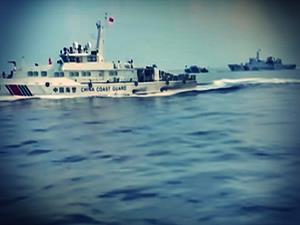
IANS Analysis: Chinese Aggression With Philippines - A Revisit To China's Old Tactics
The disturbing footage shows three Chinese boats aggressively attempting to overtake the Filipino vessel. During the ensuing scuffle, Chinese coast guards brandished knives and used strobe lights to obscure the cameras recording the aggression.
They rammed the Filipino boat, seizing and destroying essential supplies meant for the troops. One Filipino sailor lost his thumb in the attack.
These visuals are reminiscent of Chinese aggression in disputed territories, similar to the Galwan Valley clash during the peak of the Covid-19 pandemic, which resulted in the deaths of 20 Indian soldiers and 40 Chinese soldiers.
At the core of this dispute are China's erratic claims over the South China Sea.
What is at the heart of the Dispute
The South China Sea, located between the Indian and Pacific Oceans, is a shared maritime area involving China, Japan, the Philippines, Vietnam, Malaysia, and other Southeast Asian nations. China arbitrarily claims the largest portion of this maritime space.
The South China Sea is globally significant, with around $3 trillion of international trade passing through it annually.
Additionally, it is rich in natural resources, including substantial oil and gas reserves.
As China ascended to economic power, it began asserting its erratic claims over territories already historically demarcated by other South-East Asian states.
In 2016, due to these contentious claims, the Philippines initiated an international arbitration action against China under the United Nations Convention on the Law of the Sea (UNCLOS).
The Permanent Court of Arbitration ruled in favor of the Philippines, finding no legal basis for China's claims.
China, however, responded negatively to the arbitration ruling and refused to accept the binding decision. In response to China's aggressive stance in the region, major Southeast Asian powers, including the ten ASEAN members, Japan, India, Australia, and the US, have attempted to establish mechanisms for a free and open Indo-Pacific, which China opposes.
The recent confrontation between the Philippines and China in the South China Sea is not an isolated incident.
To strengthen its claim, the Philippines positioned a World War II-era ship, the Sierra Madre, on the partially submerged Second Thomas Shoal in 1999, stationing marines on it.
Over the past 25 years, the Philippines has consistently supplied essentials to the ship.
In 2021, China typically deployed only one ship during these resupply missions, but by 2023, this number had increased to an average of 14 ships. In one operation in December of last year, researchers identified at least 46 Chinese ships monitoring the second Thomas Shoal.
China continually provoking Philippines
The June 2024 incident is one of many aggressive acts by China in recent years, each escalating in provocation.
For instance, on April 30 this year, near the contentious Scarborough Shoal, Chinese coast guard ships fired water cannons at two Philippine patrol boats. Philippine officials indicated that water cannons could damage their ship engines or even capsize smaller vessels.
A similar incident occurred in March when Chinese coast guards fired water cannons near Philippine boats, injuring several crew members.
The Philippines has a longstanding security treaty with the US, one of the oldest such agreements between the US and its Asian allies.
This treaty stipulates that the US will assist the Philippines in the event of an attack or war-like situation. The Philippines has clarified that this protection extends to attacks on its coast guard.
Experts suggest that China's provocative actions in the South China Sea are not only acts of aggression but also attempts to drag the US to the brink of war.
In his keynote speech at the Shangri-La Dialogue in Singapore this year, Philippine President Ferdinand "Bongbong" Marcos Jr. declared that any fatalities resulting from the ongoing standoff with Beijing in the South China Sea would be "very, very close to... an act of war".
Responding to a question on US-Philippines mutual defense, he asserted that "we would have crossed the Rubicon" in such a scenario.
Conclusion
China has actively provoked nearly all of its neighbours, with the exception of Russia. Central to its aggression is the desire for hegemonic and authoritarian dominance in Asia.
China has consistently antagonised its neighbours, including India, Japan, Vietnam, and now the Philippines.
This pattern has intensified since Xi Jinping ascended to power. Experts describe this behaviour as 'bluff brinkmanship', where China's grey zone military maneouvers, whether in the Galwan Valley or the South China Sea, have jeopardised regional security to assert its dominance.
Similar tactics were evident in the recent clash involving knives and fists between China and the Philippines.
Should a soldier use a lethal weapon next time, it could escalate into full-scale war.
Notably, post-pandemic, China's economy is faltering, causing anxiety for Xi Jinping's authoritarian regime, which may explain the surge in skirmishes over the past decade.
The international community must address China's ongoing military escalation, while the threatened powers need to develop a collective strategy to counter its aggression.

Legal Disclaimer:
MENAFN provides the
information “as is” without warranty of any kind. We do not accept
any responsibility or liability for the accuracy, content, images,
videos, licenses, completeness, legality, or reliability of the information
contained in this article. If you have any complaints or copyright
issues related to this article, kindly contact the provider above.


















Comments
No comment